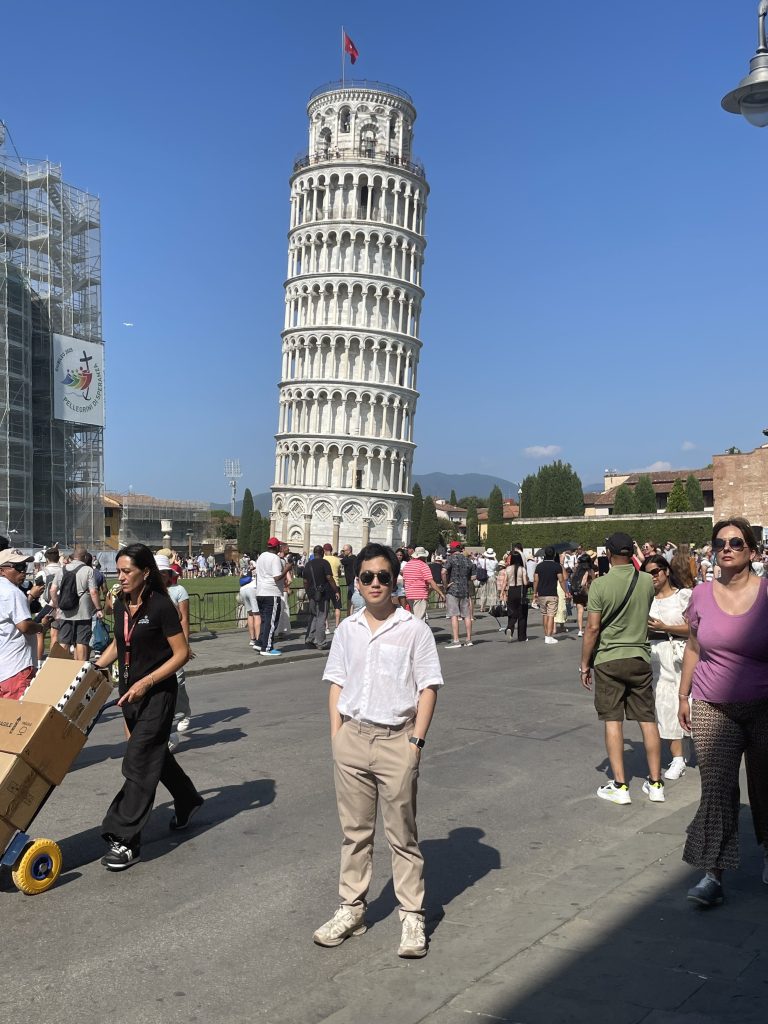
Every so often, a student comes along who fully embraces the spirit of study abroad—immersing themselves in the culture, engaging deeply with their academics, and leaving a lasting impression on everyone they meet. At Syracuse Florence, we’re proud to celebrate one such student whose time here has been nothing short of inspiring. From navigating the cobblestone streets of Florence with curiosity and confidence to forging meaningful connections both in and out of the classroom — all while commuting to the University of Pisa for his internship at an engineering laboratory — Christian Han exemplifies what it means to truly commit to the study abroad experience. In this interview, we dive into his journey, insights, and the transformative impact of his time in Italy.
Please tell us a bit about your background.
I’m from Las Vegas, born and raised. My home school is the College of Engineering and Computer Science at Syracuse University, where I’m a mechanical engineering major and currently a rising sophomore. I’m still exploring my career path, but I’ve been considering fields such as the defense industry or aeronautics. I’m also part of the Army ROTC program at Syracuse, which has shaped much of my college experience so far and has played a considerable influence on my career aspirations.
What led you to decide to do an internship abroad?
During my first year in ROTC, our instructor SFC Zellar encouraged us to study abroad, especially during the summer semester in Florence. I thought that pairing a study abroad experience with an internship would be the best way to make the most of my time here — academically, professionally, and culturally. Moreover, Syracuse is known to have an excellent study abroad program so I thought it would be best to take advantage of it while I have time and opportunity to do so.
What has been the best part of your time abroad? The most surprising?
Two parts stand out as the most memorable experiences. First is oil painting — I enrolled in a local art school here to learn oil painting from scratch, and each session has been incredibly pleasant and fulfilling. What made it even more enjoyable was having the chance to chat with other students around me, who were almost all international like myself, visiting from all around the world from New Zealand to Mexico.Second is practicing Kendo at a local dojo. I serve as the president of the Kendo Club at Syracuse University, where we haven’t had a sensei, or a proper instructor for that matter, in multiple years. That means that more experienced members like me have taken up the mantle of leadership and instruction in their place. Although we try our best, our understanding of the art is unfortunately, but understandably, limited, and it certainly shows in our lackluster performances at intercollegiate tournaments such as the annual Shoryuhai hosted by Harvard University. So being able to train in a formal dojo environment with dedicated instructors and fellow kendoka (kendo practitioners) has been an invaluable and most impactful experience, as it has not only help refine my own skills but also provided me with a wealth of knowledge that I can bring back and teach others at home.

As for what surprised me the most: how widely English is spoken here. It’s made navigating daily life much more accessible for an individual like me who finds it substantially difficult to learn a new language.
Your host mom said she wishes all students were as engaged as you are. Any tips for future students on immersing yourself in the local culture?
My advice would be to just throw yourself out there. Try new things, even if they’re outside your comfort zone, and take advantage of the many opportunities available. Every experience adds something to your perspective — whether it’s cultural, personal, or professional.
You took advantage of every opportunity we offer while you’ve been here (volunteering, book club, field trips, etc.). What have you enjoyed the most?
Volunteering has been one of the most enjoyable aspects. I spent most of my time assisting in the garden at St. James Church — planting, cultivating, and connecting with others. It felt meaningful not just as an act of service but also as a way to engage with the local community on a grounded, personal level.
How do you think your experience here will impact your future endeavors?
This experience has definitely broadened my perspective and increased my global awareness. It’s made me more open-minded and reflective. If everything goes as planned, I hope to return again in the spring semester to continue learning and growing here.
